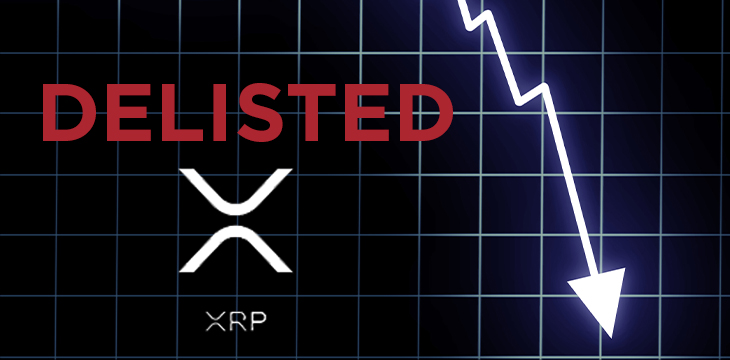|
Getting your Trinity Audio player ready...
|
Things aren’t looking great for Ripple’s XRP token, with two major exchanges announcing they will suspend trading of the asset. Citing the U.S. securities regulator’s impending lawsuit against Ripple (the company) that could declare XRP an unregistered security, both Coinbase (NASDAQ: COIN) and OKCoin published statements saying they will suspend XRP trading on January 19 and 4, 2021, respectively. OKCoin will also suspend XRP deposits.
XRP’s unit price has already dropped by over 55% in the past week in the wake of Ripple’s revelation of the SEC suit. Coinbase Pro is currently the largest XRP/USD market by volume (US$219,088,843 in the past 24 hours). The most active market for XRP, however, is the XRP/USDT market on Binance ($582,476,171 in the past 24 hours)—however at press time Binance is yet to release a statement on the matter. A handful of other exchanges, including Bitstamp, have already suspended XRP trading.
Given the SEC’s recent action against Ripple, all XRP books have been moved to limit only and Coinbase plans to fully suspend trading in XRP on Tuesday, January 19, 2021, at 10 AM PST. Afterwards, users will continue to retain access to their XRP funds. https://t.co/izreZvgHNl
— Coinbase 🛡️ (@coinbase) December 28, 2020
Coinbase Chief Legal Officer Paul Grewal wrote in a blog post that the exchange “takes seriously any decision to change our customers’ access” to a listed digital asset, and stated explicitly that the suspension comes as a direct result of the SEC’s legal action against XRP creator Ripple. He said:
“We strive to provide our customers with access to a broad set of assets, all of which are evaluated against our Digital Asset Framework to assess factors like security, compliance, and the project’s alignment with our mission of creating an open financial system for the world.”
Coinbase will continue to support XRP on its Coinbase Custody and Coinbase Wallet platforms.
It is important to note that suspending trading at this point would not remove any potential legal liabilities exchanges may have for past XRP trading. Given the SEC’s interest in several other token issuances over the past decade, compliance officers are likely taking a closer look at some of their companies’ past and current listed assets.
It’s uncertain when, or if, either of the above exchanges will begin trading XRP again. In its statement, OKCoin noted that “it is likely that this situation will take time to reach a resolution. We will proactively inform our customers when we have information that may change our position.”
OKCoin users who have borrowed from the XRP/USD margin pair (either currency) will be required to return what they’ve borrowed before 7:00PM PST on January 3rd, 2021. Any trader who doesn’t meet that deadline will have their position liquidated.
What’s the SEC suit all about?
Ripple announced a few days ago it had been advised of impending legal action by the U.S. Securities and Exchange Commission (SEC) against the company, and personally against its CEO Brad Garlinghouse and founder Chris Larsen.
The SEC claims XRP (commonly also referred to as “Ripple”) is an investment contract, and as such violates U.S. investor protection laws. Ripple (the company) has strongly denied the connection, countering that XRP is not only a currency, but one that is better than either Bitcoin or Ethereum‘s Ether.
Ripple launched in its new form as a digital payments network in 2012 (based on a concept originally revealed in 2005), issuing all 100 billion XRP tokens at once, of which 45 billion circulates on the open market. Though the stated original purpose of the network was to allow banks and payment providers to settle accounts faster, the XRP token itself became a popular trading asset. Despite its comparatively low unit price, it has long been in the top five digital assets by market cap, thanks to its large circulating supply.
At issue is how the circulating supply of XRP made it to the market, and under what conditions Ripple issued them. Ripple claims it was via a network of brokers, OTC traders, and markets outside the United States. More details regarding Ripple’s structure and initial XRP allocation could come to light as the SEC’s action proceeds.
Follow CoinGeek’s Crypto Crime Cartel series, which delves into the stream of groups—from BitMEX to Binance, Bitcoin.com, Blockstream, ShapeShift and Ethereum—who have co-opted the digital asset revolution and turned the industry into a minefield for naïve (and even experienced) players in the market.

 02-23-2026
02-23-2026 




